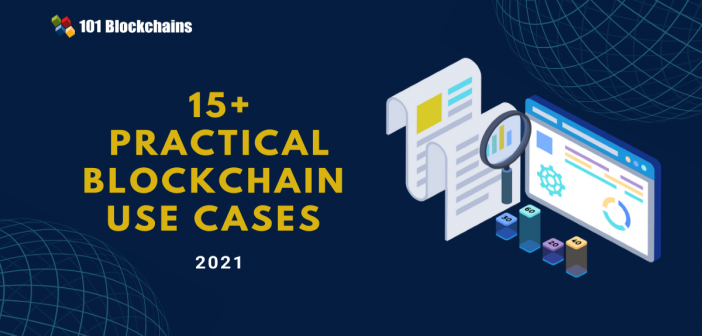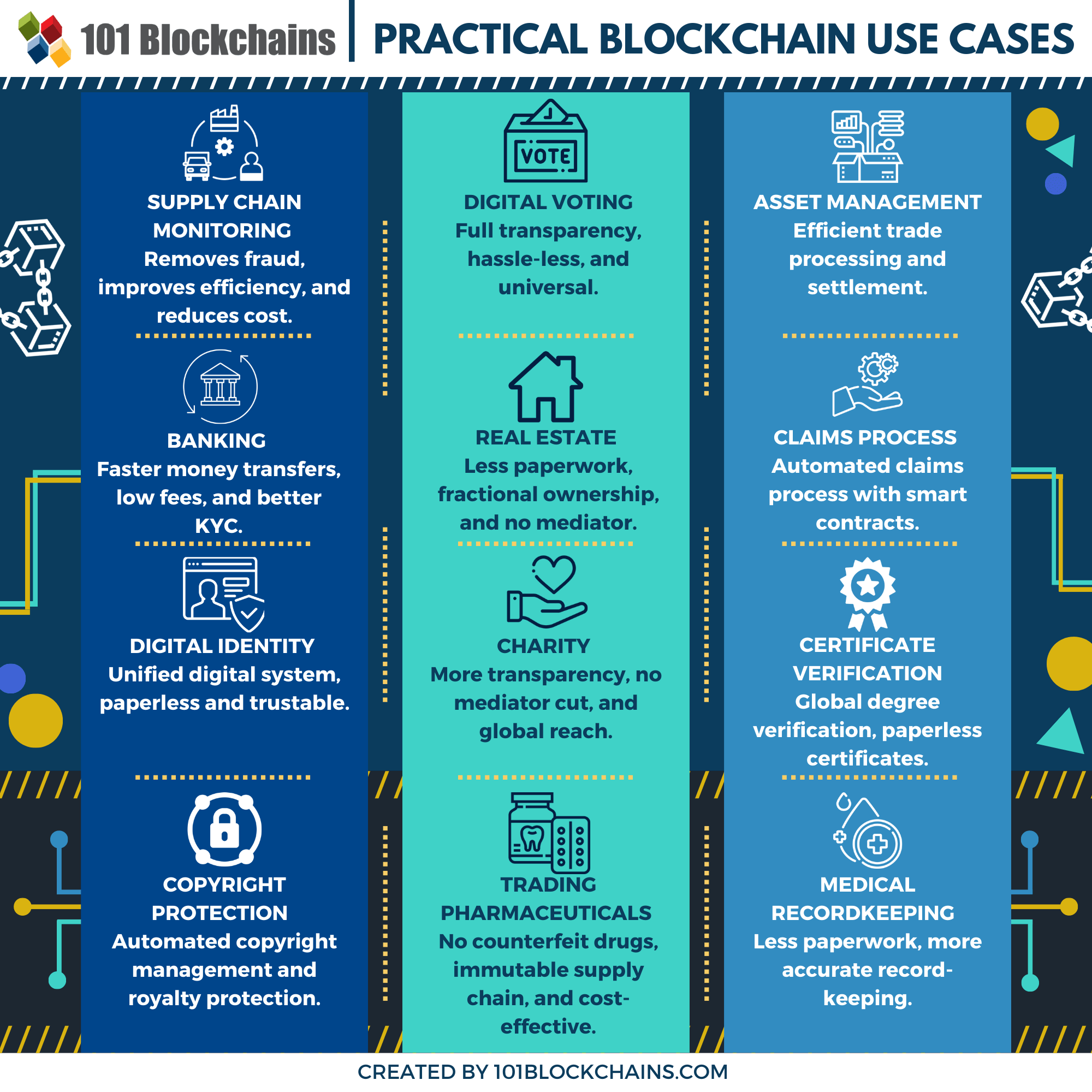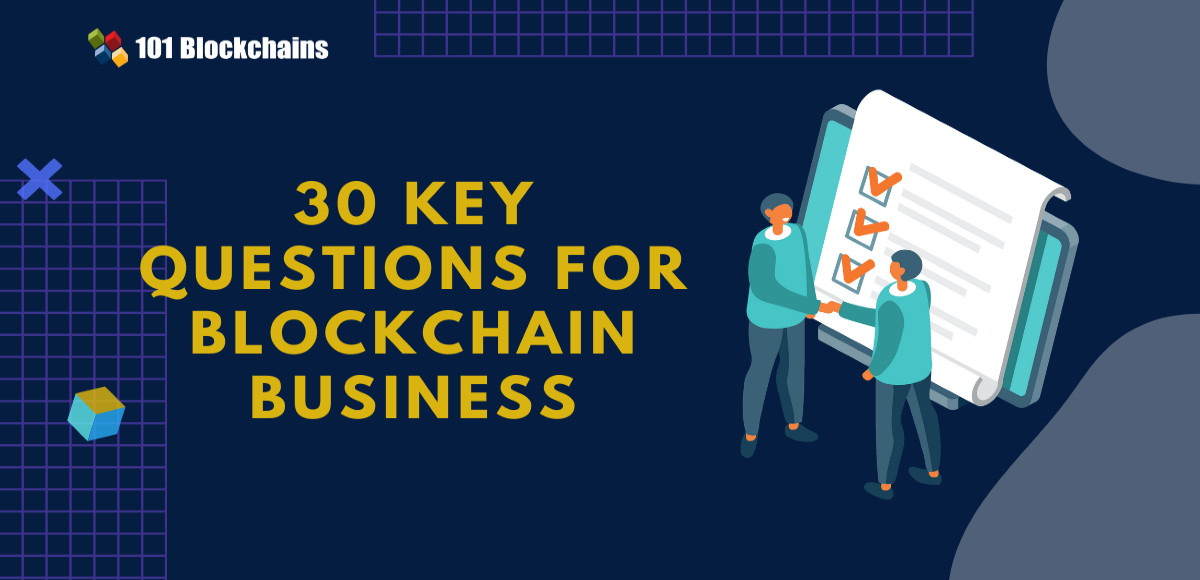Learn how blockchain truly works, master key definitions, and uncover what makes smart contracts so "smart." Dive into the fundamentals, gain valuable insights, and start your blockchain journey today!

- Opinions
101 Blockchains
- on January 28, 2021
15+ Practical Blockchain Use Cases in 2022
In this article, we will discuss practical blockchain use cases ranging from healthcare, banking, real estate, and more!
We are in 2022! The start of the new decade opens up a lot of possibilities.
Blockchain technology can provide businesses and governments to bring more changes to the already expanding market.
Theory crafting can only give you answers that can satisfy a certain aspect of the audience. However, things can run differently when it comes to the practical world out there.
One of the best ways to understand blockchain is to look at the practical use cases of blockchain and its offers. That’s why we are going to look at the best practical blockchain use cases.
Build your identity as a certified blockchain expert with 101 Blockchains’ Blockchain Certifications designed to provide enhanced career prospects.
Best Practical Use Cases of Blockchain
Before we get started, let’s take a look at the brief introduction of blockchain.
What is Blockchain Technology?
If you have never heard about blockchain, then do not worry. We will try to explain it as simple as possible.
Blockchain is a network of peers who can interact, communicate, and transfer information without being dependent on a centralized entity. The key features of blockchain include transparency, security, immutability, and decentralization.
A blockchain utilizes a consensus algorithm that ensures that the transactions done within the network are valid and authenticated to achieve all of these.
Let’s take a look at a more simplistic representation.
You can visualize the blockchain as a Zynga tower. There are small pieces that hold the whole tower. If you remove one block, then the whole tower will fall off. This means that the integrity of the tower is broken if one block is removed or changed. Blockchain works the same way as each block is verified with the help of the previous block. The data integrity is what makes blockchain so amazing!
Now, coming back to the real use cases of blockchain, let’s begin our list of the best enterprise blockchain use cases.
Watch This Video To Know About Some Top 10 Blockchain Use Cases Right Now!
Blockchain Use Cases by Industry
There are so many companies using blockchain technology for their companies. Let’s check out some of the blockchain use cases by industry.
Please include attribution to 101blockchains.com with this graphic. <a href='https://101blockchains.com/blockchain-infographics/'> <img src='https://101blockchains.com/wp-content/uploads/2020/01/practical-blockchain-use-cases.png' alt='practical blockchain use cases='0' /> </a>
-
Supply Chain Monitoring
One of the best practical use cases of blockchain is supply chain monitoring. The supply chain is an integral part of our economy.
Have you ever wondered how you get your bread in the morning? It is all because of impeccable supply chain systems that are implemented across the place you are staying in. If the supply chain is not working properly, you get delayed products or no products.
A problem in the supply chain can also lead to a shortage. However, this is not where the supply chain problems end. One of the biggest concerns for companies and consumers like you is to get rid of fake or fraud items that can get into the supply chain by fraud elements in the market.
The solution? You guessed it – blockchain. Blockchain for supply chain offers immutability and the ability to monitor the supply chain products throughout its journey.
It offers enough transparency for the companies to track the products. Companies can monitor fraud elements in the supply chain and find out about the inefficiencies that are part of the supply chain. This means that they can improve the supply chain by monitoring it through blockchain. Supply chain monitoring is the most practical use-case of blockchain.
Curious to learn about blockchain for supply chain? Enroll in Enterprise Blockchains And Supply Chain Management Course!
- Payment Processing and Money Transfers
Another one of the real-time applications of blockchain is payment processing. What is the last time you tried to transfer the money to someone who lives in a different country? If you did, then you know how hard it is to send money overseas.
If you are working in a different country, then it becomes a whole new problem. Transferring money overseas can leverage a lot of fees as well. This makes the income of people earning overseas lower than what they earn. On top of that, you also need to wait for a few days before a transaction is completed. Banks and foreign exchange regulations make all of these restrictions.
Clearly, blockchain is the solution to money transfers, especially to overseas money transfers. They can save you the hassle as blockchain enables you to do instant transfers even across borders.
Banks also use cryptocurrencies to manage overseas funds as they are swift and cost less than doing it in a more traditional manner. Ripple is one of the cryptocurrencies that are controlled by banks to do money transfers. It is largely used for bank-to-bank transfers.
This is one of the finest practices and real use cases of blockchain.
Start your blockchain journey Now with the Enterprise Blockchains Fundamentals
-
Digital Identity
Another one of the real-time applications of blockchain is digital identity. Identity is one of the biggest challenges of our society. There is clearly a lot of noise around identity. People have to carry documents all the time to do even the smallest of tasks.
Companies all around the world also suffer from the need for a unified digital identity system. If you are working in any of the big companies, you would have already encountered identity at your workplace. Companies are reluctant to use a biometric identity system.
Apart from the working environment, the general population also would love a system that helps them get identified in the most secure way.
The answer is a blockchain-based digital identity system. Big companies also acknowledge the use-case and work towards apps that let’s create a digital identity for their employees and the world. The work towards creating a global identity is way far away from now, but the work has already started in the right direction.
-
Royalty Protection and Copyright
Copyright is also one sector that requires attention from the likes of blockchain. If you are part of the creator’s industry, you know how hard it is to protect your creation.
There are many ways to copyright your work, but that doesn’t mean that your work is always protected. For instance, you wrote an e-book and wanted to distribute your work through platforms such as Amazon.
A buyer buys the book and then distributes it without your knowledge of different PDF files. The other users are also downloading the book and distributing it without your knowledge. They are violating basic copywriting rules, but hard to detect and then punish.
One of the best ways to provide copyright and royalty protection is by using blockchain. Blockchain offers a unique approach by providing content through the network. As the blockchain is a vast network that provides transparency, anyone trying to break copyright can be reported automatically and be executed according to the copyright laws. The same can be said for the royalty protection where the creator gets paid for their creations.
-
Cyber Security
No platform or information system can be 100% secure. That’s why cybersecurity is as complicated as it is now. However, we can see a better “cyber-security” in the future. It is possible with the help of blockchain. Blockchain can play a crucial role in solving a lot of system security. However, the use of blockchain in security can more time.
Blockchain can improve cybersecurity with the use of decentralized storage solutions. As data is stored in a decentralized manner, there won’t be a single point of attack for hackers. Most of the time, businesses rely heavily on a centralized system that is not an ideal way of storing data — at least from a security point of view.
We can also see DNS security improve with decentralization. It can help decrease DDoS attacks. Other aspects of the system, such as messaging, can also see a boost in security. Immutability also means that hackers cannot do fraud or data theft. Cybersecurity blockchain usage is one of the biggest challenges.
-
Digital Voting
Voting systems have always been scrutinized all around the world. Sometimes they are scrutinized for transparency or the speed at which voting takes place. It is common for people to stand in line for hours before they get their chance to vote. This is not a healthy way to vote, especially for special people who cannot stand in line for so long.
This is where Digital voting comes in. The idea of digital voting stems from the blockchain. As blockchain offers transparency, immutability, and security, it is an ideal system/platform for conducting the voting.
-
Real Estate
Real estate is not at its best. Right now, if you want to make a purchase, then you need to go through a long process of documentation, verification, and transfer of ownership. There is currently a lot of paperwork that goes in while buying or selling a property. On top of that, you also need to do verification work for both parties. If you are taking a loan, then things get more complex as more paperwork needs to be done.
Lastly, there are also chances of getting fraud. The fraud generally happens from sellers who sell their property to multiple parties at the same time, which makes them hard to catch.
To solve all these issues, we have blockchain at our hands. If you ever want to buy a house faster, you need to take blockchain. Blockchain offers the ability to tokenize real-world assets. This means that the sellers can sell their land or property with the use of smart contracts.
They can create a legal process by coding it in the smart contract and then execute it when the terms are met. For instance, if the buyer pays the amount, then the legal owner of a property is transferred to the buyer in a matter of a few minutes. Blockchain for real estate can also offer the ability to remove fraud by ensuring transparency, immutability, and security.
Want to learn about real estate tokenization? Enroll Now in Blockchain For Real Estate Masterclass
-
Healthcare – Medical Recordkeeping
Another way blockchain can be useful is to provide a way to do medical record keeping. Patients find it hard to keep their documents intact and at the same place. The documents get complex with time, and if you are visiting multiple doctors, it becomes hard to maintain. Also, if you are part of the healthcare institution, you would know how hard it is to do recordkeeping.
With blockchain, everything can be accessed from anywhere. Patients data can be recorded in the blockchain. They can access it anytime and update it when they visit their doctor. Doctors can also be confident when they take a look at the patient’s data. Overall, it is a win-win situation for both patients and practitioners.
This is a perfect example of practical use cases of blockchain for healthcare.
-
Healthcare – Tracking Medicines
Blockchain usage also covers one more pain point of healthcare. It can help track medicines. By doing so, fake medicines can be removed from the medicine supply chain. This is possible due to how blockchain stores data. When a new medicine is recorded with the supply chain, it generates a bunch of information, including a hash number that is stored in the blockchain.
If someone tries to change the medicine in the supply chain, the hash number will not match — which can then prompt the system to remove it from the supply chain.
In the end, you, as a consumer, will get access to medicines that are authentic in nature. The companies also benefit from this as it saves them millions of dollars.
-
Asset Management
Other practical use cases of blockchain are asset management. In asset management, traders can manage and trade assets. This makes it one of the risky trades to be in. Each party needs to be very methodological in its approach. To reduce the risk, each party needs to have key players when doing asset management. This includes having a custodian, broker, or settlement manager. They take care of the records and ensure that no errors creep in when managing those records.
That’s a lot of work for doing asset management. Blockchain empowers asset managers to work more efficiently. They can use blockchain to reduce errors and ensure the whole process is smoother than ever. They can remove mediators if needed.
Get familiar with the terms related to blockchain with Blockchain Basics Flashcards.
-
Entertainment
As a creator, it is not possible to reach the right audience due to the mediators and platforms that control the content distribution. For instance, if you are a music developer, then you have to register on the popular music platform devices, and then they distribute your work. This can be limiting in many ways due to the algorithm that you are going to use. On top of that, these mediator platforms also take a good amount of fees as a cut.
With blockchain, musicians can directly connect with their audience and sell their music directly to them without a mediator’s need. There are already platforms that offer payment options through blockchain, and anyone familiar with basic cryptocurrency can buy music through blockchain.
-
Insurance
Insurance claims are next on our list of blockchain applications. In reality, insurance claims can also be improved with the help of blockchain. Insurance is one of the big industries that need re-work. Blockchain can help just that. Currently, if you take insurance, you have to go through big hassles when claiming it.
It requires keeping in contact with your insurance guy and also requires a good amount of documentation.
The claims process is simplified with blockchain’s help as it can store information securely, and hence can be verified for processing the claim. Once the claims are uploaded to the blockchain network, the claims are then transmitted to the relevant parties. The parties then go through the information and release the insurance.
Smart contracts can also help improve the claims process’s automation, where the user can simply put claims and get their claims once approved. This can be achieved on some type of insurance, but not all. As you can see, blockchain for insurance can offer a lot of possibilities.
Start your blockchain journey Now with the Enterprise Blockchains Fundamentals
-
Education
Educational degrees are a key part of our education system.
It offers validity to someone’s skill and offers insight into what they are capable of. However, they are hard to verify and carry. It is also easy to fraud and can lead to cases where candidates get jobs that they do not deserve. The solution to all of these is a blockchain-powered distribution-verification system.
The candidates can now get digital certificates and degrees. All these are digitally generated with the help of blockchain. They are associated with the digital identity of the candidate and hence can be verified at any time. The certificates are also accessible by the person anywhere, which makes them more manageable and easier to access.
This practical use case of blockchain can be implemented worldwide among universities, online courses and more!
Start learning Blockchain with World’s first Blockchain Skill Paths with quality resources tailored by industry experts Now!
-
Logistics
Logistics is one of the major industries that needs a drastic change at the moment. In reality, this industry is dealing with a lot of issues, which is practically overwhelming. In this case, blockchain can step up and help in removing most of the issues. Let’s check out what blockchain for logistics can really offer:
Blockchain can comes with a authentication process and help in validating all of the data. More so, as no one can really change the data, so every single element will be out of the reach of any malicious parties. It can also help in tracking all of the demands and make the deliveries in time.
Blockchain can also make a secure channel for all vehicle-to-vehicle communication and therefore streamline them in order to increase the efficiencies.
-
Humanitarian Aid
Charity is next on our list of blockchain applications. Charity is one of the noble things that you can do for the needy. However, it is not free from problems. There is a constant need for transparency in the charities that are carried out right now. As a donator, you also need to know how and where your donation is going to be used.
With blockchain, all of these are possible. As blockchain is transparent, all donations can be tracked. Also, the company or organization carrying the transactions has to be more discreet in how they are spending the donations. Blockchain-powered donations are also ideal for communities that want to remove brokers to save the commission and provide maximum benefit to the needy.
Start learning Blockchain with World’s first Blockchain Career Paths with quality resources tailored by industry experts Now!
Conclusion
This leads us to the end of our 15+ practical use cases of blockchain. We hope that the article gave you a clear understanding of what blockchain can do in real practical use. It has a wide range of practical use cases, including healthcare, supply chain, real estate, and so on. Each of these sectors sees a diverse set of blockchain practical use cases.
Blockchain has the ability to change the world. If you also want to participate in the blockchain ecosystem, we will recommend starting with our blockchain courses.
*Disclaimer: The article should not be taken as, and is not intended to provide any investment advice. Claims made in this article do not constitute investment advice and should not be taken as such. 101 Blockchains shall not be responsible for any loss sustained by any person who relies on this article. Do your own research!





![Future of Blockchain: Predictions for 2022 [UPDATED] future of blockchain predictions](https://101blockchains.com/wp-content/uploads/2020/12/future-of-blockchain-predictions.png)

